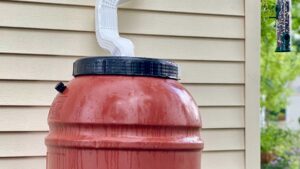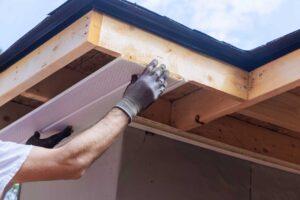A storm-ready home starts with a storm-ready gutter system.
Florida homeowners understand that hurricane season is part of life—but preparation can mean the difference between a home that weathers the storm and one that’s left with thousands in damage. While many people focus on stocking supplies, reinforcing windows, and checking insurance policies, one critical element is often overlooked: the gutter system.
Your gutters play a major role in protecting your home during high winds and heavy rain. As we approach hurricane season, now is the time to make sure your gutter system is not just functional—but storm-ready.
The Role of Gutters During a Hurricane
When a tropical storm or hurricane strikes, the most immediate threat to your home often comes from heavy, sustained rainfall. A well-designed gutter system collects and redirects this water, keeping it away from:
- Your foundation
- Your roofline and fascia
- Your siding and windows
- Your landscaping and walkways
When gutters fail during a storm, water overflows the system and cascades down the side of the home. This can lead to basement flooding, roof rot, soil erosion, and even structural damage.
And with the frequency of back-to-back storms in Florida, your home rarely gets a chance to dry out between rainfall events—making moisture management all the more urgent.
Is Your Gutter System Hurricane-Ready?
Here’s how to assess whether your current setup is prepared for what’s coming:
1. Is Your System Seamless?
Seamless gutters are far less prone to leaks than traditional sectional systems. Fewer joints = fewer weak points when wind and rain hit hard.
2. Are Your Gutters Properly Sloped?
The pitch of the gutter determines whether water flows toward downspouts—or backs up and spills over. A poorly pitched system is a guaranteed overflow risk.
3. Are Downspouts Placed Correctly?
Downspouts should move water away from your home’s foundation. If they’re too short, blocked, or aimed incorrectly, water can pool in vulnerable areas.
4. Do You Have Gutter Guards?
During hurricanes, debris from trees, roofing materials, and high winds can clog gutters fast. Guards help keep your system flowing even when conditions are rough.
Florida-Specific Challenges
What makes Florida particularly demanding for gutter systems during hurricane season?
- High rainfall volume: A single storm can drop several inches of rain in hours.
- Wind-driven rain: Rain doesn’t fall straight down—it blasts sideways, testing every joint and seam.
- Foliage and debris: Palm fronds, oak leaves, and roofing granules can quickly clog unprotected gutters.
- Extended wet seasons: When the ground is already saturated, excess runoff can cause even more damage.
In short, your gutters don’t just need to work—they need to work exceptionally well.
What Happens When Gutters Fail in a Storm?
Here’s what we often see after a storm when a homeowner’s gutter system wasn’t up to the task:
- Interior leaks from backed-up water entering soffits or roof decking
- Mold or mildew caused by water entering wall cavities
- Erosion of garden beds, mulch, and lawn
- Foundation cracks due to water pooling near the base of the home
- Detached gutters ripped away by wind due to improper fastening or age
Many of these problems don’t appear immediately—they show up weeks or months later, when water damage reveals itself through staining, smells, or structural issues.
How to Prepare Your Gutters for Hurricane Season
Proactive maintenance and upgrades now can help you avoid major headaches later. Here’s what we recommend:
- Schedule a professional inspection to check for sagging, clogs, leaks, or improper slope.
- Upgrade to seamless gutters if you still have a sectional system.
- Install gutter guards to reduce clogs from hurricane debris.
- Extend or redirect downspouts to move water farther from the home.
- Repair damaged soffit or fascia before it becomes a water entry point.
Even small adjustments—like tightening brackets or resealing joints—can make a big difference in a storm.
Final Thoughts
In Florida, hurricane season is inevitable—but preventable water damage doesn’t have to be. Your gutters are one of the simplest, most affordable lines of defense you can have.
Don’t wait until a tropical storm is in the forecast to find out your system isn’t ready. Take action now, and enjoy peace of mind all season long.



